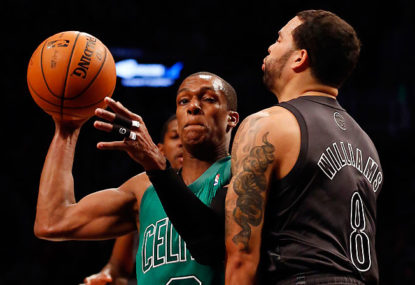NBA’s global stars usher in new era as LeBron, Steph, KD fade into the background
A Serbian, a Canadian, a Slovenian and a Greek fellow walked into a bar … Well, they’ve actually walked into the NBA and now…

‘Whatever it takes.’ It’s not just a mission statement in sports, it’s a war cry.
It’s never just a game – it’s a fight. For yourself, for your teammates, for your family, for your city. For your manhood. Whatever it takes.
Sledging is the often dirty offspring of ‘whatever it takes.’ The rulebook is the rulebook but if you can find an edge outside of the game’s physical dimensions, so be it.
If it helps your team win, you’re doing a good service. If the opponent can’t handle it, that’s indicative of their weakness, not your own.
Sometimes sledging is nothing more than light, playful banter, like Dane Swan asking his tagger what his name is. Sometimes it’s astutely effective mental warfare, like Nathan Buckley mocking Nick Davis for ducking his head going back into a pack.
But so often sledging has nothing to do with the game itself; it’s just a dimly lit avenue for vindictiveness. And when sledges cross the line into slurs, the avenue becomes illuminated for the public to see. The problem is that even with the lights on, not enough is being done.
In recent years there have been three notable gay slurs levelled in the NBA, all involving the word ‘faggot.’ Kobe Bryant lobbed the F-grenade at a referee in 2011 and was fined $100,000. The same year Joakim Noah shouted the same slur at a heckling fan in the crowd and received a $50,000 fine.
While inexcusable, Bryant and Noah’s slurs were not political in nature. They lost their cool.
Rajon Rondo didn’t lose his cool for a second or two like Bryant and Noah when he went after referee Bill Kennedy three weeks ago in Mexico City. Rondo didn’t utter one line to a stranger, he went on a homophobic tirade against a man whose homosexuality was common knowledge in NBA circles. His menace and persistence was such that he had to be restrained by five different people.
Rondo got a one-game suspension for his troubles. On one hand, the punishment doesn’t seem commensurate with his bigoted crime. On the other hand, there’s a collective bargaining agreement in play, potential legal repercussions, and it’s the first time that the NBA has ever suspended a player for language. But the suspension isn’t the point here – all it does is provide cloud cover for a more uncomfortable subject.
As Kevin Arnovitz, Zach Lowe and Tim Bontemps have discussed recently on their respective podcasts, gay slurs are common and accepted in the vernacular of NBA gyms. A lack of toughness on the court is perceived to correlate with homosexuality, a perception that has prospered unabated for far too long.
That’s why the discourse surrounding the Rondo slur shouldn’t be about a suitable punishment. The discourse shouldn’t be about punishing what he said, it should be about understanding why he said it, and why it was remarkable and surprising only in its intensity, not its substance.
Figuring out whether or not Rajon Rondo is truly homophobic is a pointless exercise. What is clear is that when he was, in his own words, overcome with frustration and emotion the first place his brain went was the f-word.
My actions during the game were out of frustration and emotion, period!
— Rajon Rondo (@RajonRondo) December 14, 2015
The most disturbing thing about the repeating f-word event is who the perpetrators were. Bryant, Noah and Rondo are three of the smartest, most cerebral players in the league. The fact that their instinct to get under someone’s skin was to use the f-word is as illuminating as it is depressing.
The NBA has passively condoned homophobia by letting slurs be thrown around in gyms as casually as passes to the corner. Rondo’s attack wasn’t a shocking behavioural outlier, it was simply the ugly product of an environment that incubates carelessness.
‘Whatever it takes.’ NBA players talk about their teammates as brothers, their games as battles, their losses as soul-destroying and their victories as life-affirming. The importance of the sport is never understated. If it’s not life and death for you, in the NBA you’re already dead.
Stressing the importance of the sport so violently has created a climate where defeat is conflated with mortality.
Frustration builds to the point where it’s not the game the players are frustrated with, it’s their life, because that’s what the game is. And when that is threatened, the response is to attack someone else’s life. To attack and undermine who they are as a person, who they are as a man. To find an edge.
It’s impossible to treat professional sport, especially a league as big as the NBA, as just a game. There’s too much attention and too much money involved. It’s not just a game, and it is important.
But it’s not more important than the core values required to be a decent human being, and sport has always put those things secondary to the game. Just look at Greg Hardy.
Professional sports leagues and the NBA in particular are leaders in the community, preaching equality and tolerance. But they’re doing it when it suits them. Education is a vague desire, not an enforced imperative. They’re not doing whatever it takes, and that’s the difference.